Canada's NRF Contribution to NATO: Strengthening Trans-Atlantic Ties
VerifiedAdded on 2022/04/14
|12
|3048
|48
Report
AI Summary
This report analyzes the relevance of the NATO strategic concept to Canadian foreign policy on security and stability. It explores how Canada's interests are served through its engagement in the globally oriented military alliance, while maintaining its internationalist policy in operational engagements and partnerships, including those outside the Alliance's territory. The discussion covers the historical context of NATO, Canada's contributions, and the evolving role of the NRF (NATO Response Force). The paper assesses the need to redefine and align Canada's NRF contribution to better fit Trans-Atlantic partnerships and achieve NATO goals, considering the influence of the United States, the evolution of global security, and the importance of multilateral partnerships. The report concludes by recommending improvements to Canada's security services through international collaborations without necessarily realigning the security policy to NATO, emphasizing the significance of maintaining a seat within the multilateral mandate and worldwide focus of NATO.
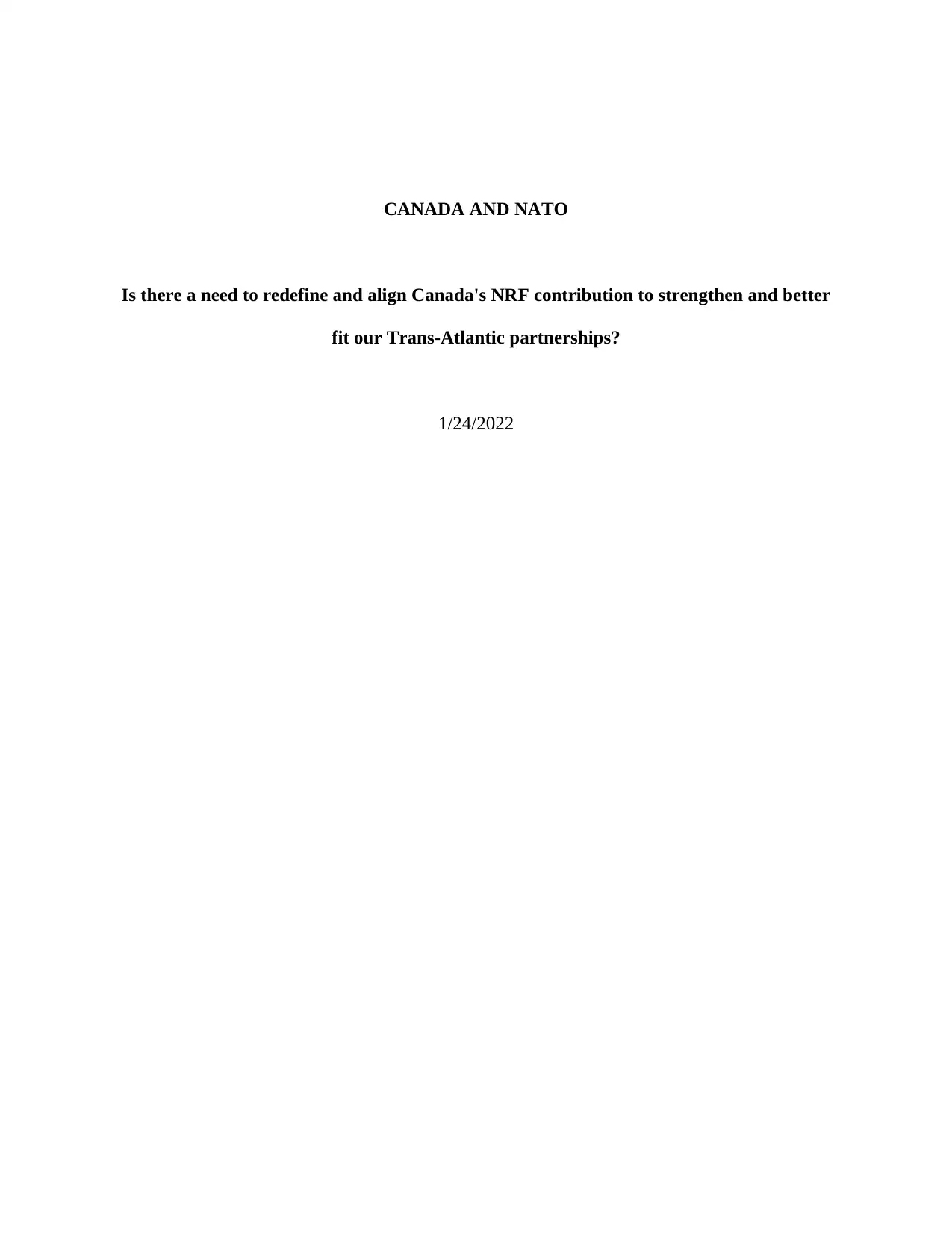
CANADA AND NATO
Is there a need to redefine and align Canada's NRF contribution to strengthen and better
fit our Trans-Atlantic partnerships?
1/24/2022
Is there a need to redefine and align Canada's NRF contribution to strengthen and better
fit our Trans-Atlantic partnerships?
1/24/2022
Paraphrase This Document
Need a fresh take? Get an instant paraphrase of this document with our AI Paraphraser
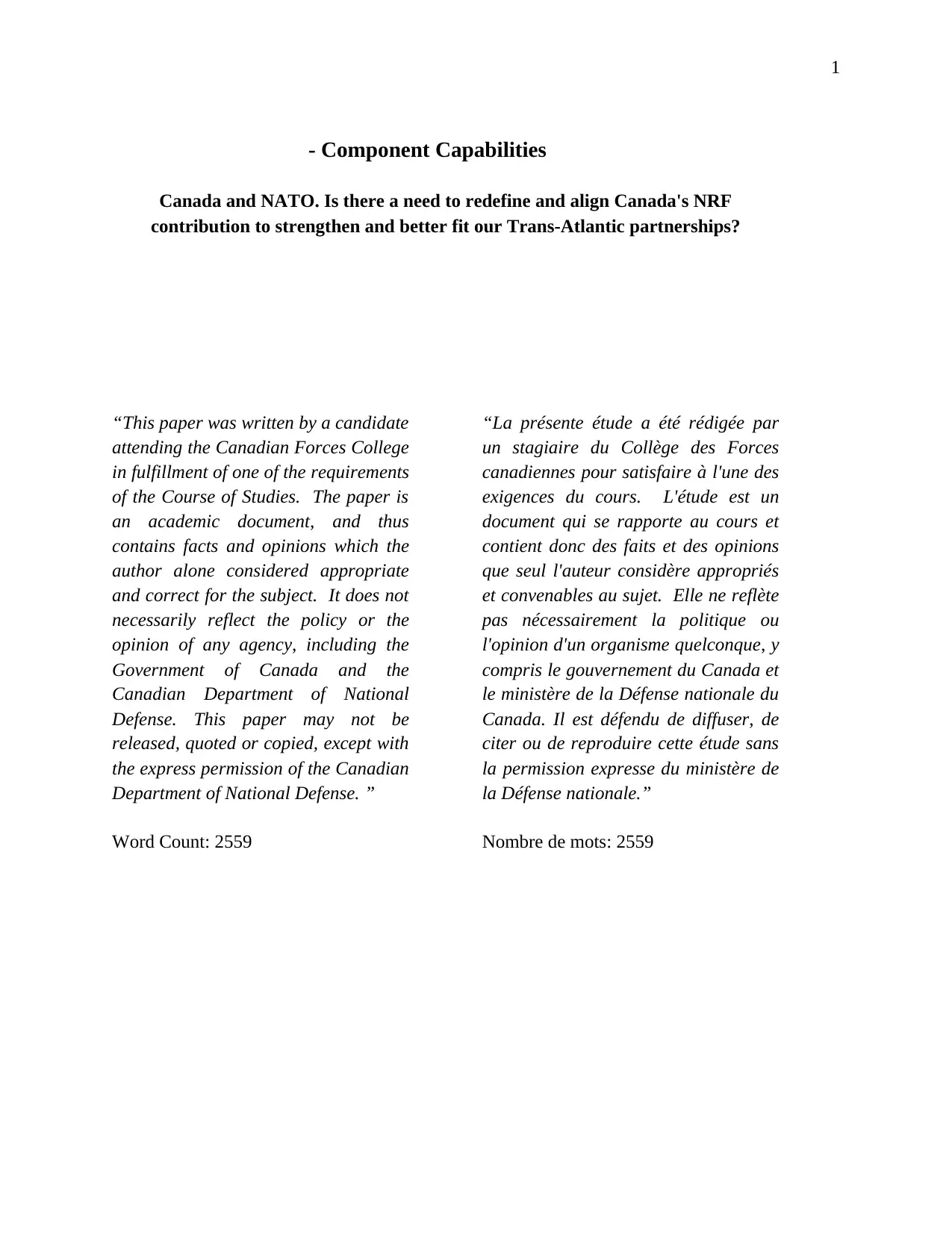
1
- Component Capabilities
Canada and NATO. Is there a need to redefine and align Canada's NRF
contribution to strengthen and better fit our Trans-Atlantic partnerships?
“This paper was written by a candidate
attending the Canadian Forces College
in fulfillment of one of the requirements
of the Course of Studies. The paper is
an academic document, and thus
contains facts and opinions which the
author alone considered appropriate
and correct for the subject. It does not
necessarily reflect the policy or the
opinion of any agency, including the
Government of Canada and the
Canadian Department of National
Defense. This paper may not be
released, quoted or copied, except with
the express permission of the Canadian
Department of National Defense. ”
“La présente étude a été rédigée par
un stagiaire du Collège des Forces
canadiennes pour satisfaire à l'une des
exigences du cours. L'étude est un
document qui se rapporte au cours et
contient donc des faits et des opinions
que seul l'auteur considère appropriés
et convenables au sujet. Elle ne reflète
pas nécessairement la politique ou
l'opinion d'un organisme quelconque, y
compris le gouvernement du Canada et
le ministère de la Défense nationale du
Canada. Il est défendu de diffuser, de
citer ou de reproduire cette étude sans
la permission expresse du ministère de
la Défense nationale.”
Word Count: 2559 Nombre de mots: 2559
- Component Capabilities
Canada and NATO. Is there a need to redefine and align Canada's NRF
contribution to strengthen and better fit our Trans-Atlantic partnerships?
“This paper was written by a candidate
attending the Canadian Forces College
in fulfillment of one of the requirements
of the Course of Studies. The paper is
an academic document, and thus
contains facts and opinions which the
author alone considered appropriate
and correct for the subject. It does not
necessarily reflect the policy or the
opinion of any agency, including the
Government of Canada and the
Canadian Department of National
Defense. This paper may not be
released, quoted or copied, except with
the express permission of the Canadian
Department of National Defense. ”
“La présente étude a été rédigée par
un stagiaire du Collège des Forces
canadiennes pour satisfaire à l'une des
exigences du cours. L'étude est un
document qui se rapporte au cours et
contient donc des faits et des opinions
que seul l'auteur considère appropriés
et convenables au sujet. Elle ne reflète
pas nécessairement la politique ou
l'opinion d'un organisme quelconque, y
compris le gouvernement du Canada et
le ministère de la Défense nationale du
Canada. Il est défendu de diffuser, de
citer ou de reproduire cette étude sans
la permission expresse du ministère de
la Défense nationale.”
Word Count: 2559 Nombre de mots: 2559
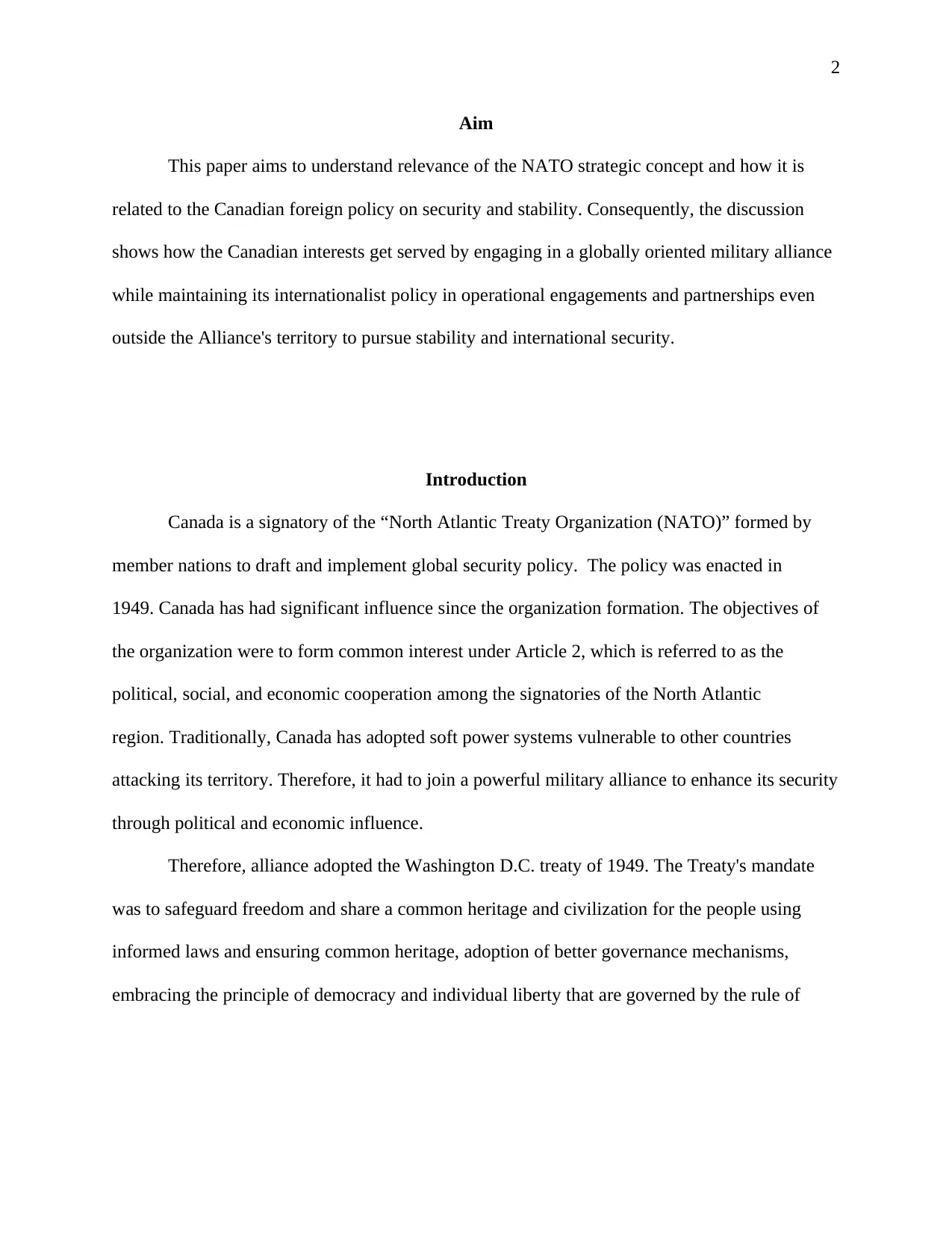
2
Aim
This paper aims to understand relevance of the NATO strategic concept and how it is
related to the Canadian foreign policy on security and stability. Consequently, the discussion
shows how the Canadian interests get served by engaging in a globally oriented military alliance
while maintaining its internationalist policy in operational engagements and partnerships even
outside the Alliance's territory to pursue stability and international security.
Introduction
Canada is a signatory of the “North Atlantic Treaty Organization (NATO)” formed by
member nations to draft and implement global security policy. The policy was enacted in
1949. Canada has had significant influence since the organization formation. The objectives of
the organization were to form common interest under Article 2, which is referred to as the
political, social, and economic cooperation among the signatories of the North Atlantic
region. Traditionally, Canada has adopted soft power systems vulnerable to other countries
attacking its territory. Therefore, it had to join a powerful military alliance to enhance its security
through political and economic influence.
Therefore, alliance adopted the Washington D.C. treaty of 1949. The Treaty's mandate
was to safeguard freedom and share a common heritage and civilization for the people using
informed laws and ensuring common heritage, adoption of better governance mechanisms,
embracing the principle of democracy and individual liberty that are governed by the rule of
Aim
This paper aims to understand relevance of the NATO strategic concept and how it is
related to the Canadian foreign policy on security and stability. Consequently, the discussion
shows how the Canadian interests get served by engaging in a globally oriented military alliance
while maintaining its internationalist policy in operational engagements and partnerships even
outside the Alliance's territory to pursue stability and international security.
Introduction
Canada is a signatory of the “North Atlantic Treaty Organization (NATO)” formed by
member nations to draft and implement global security policy. The policy was enacted in
1949. Canada has had significant influence since the organization formation. The objectives of
the organization were to form common interest under Article 2, which is referred to as the
political, social, and economic cooperation among the signatories of the North Atlantic
region. Traditionally, Canada has adopted soft power systems vulnerable to other countries
attacking its territory. Therefore, it had to join a powerful military alliance to enhance its security
through political and economic influence.
Therefore, alliance adopted the Washington D.C. treaty of 1949. The Treaty's mandate
was to safeguard freedom and share a common heritage and civilization for the people using
informed laws and ensuring common heritage, adoption of better governance mechanisms,
embracing the principle of democracy and individual liberty that are governed by the rule of
⊘ This is a preview!⊘
Do you want full access?
Subscribe today to unlock all pages.

Trusted by 1+ million students worldwide
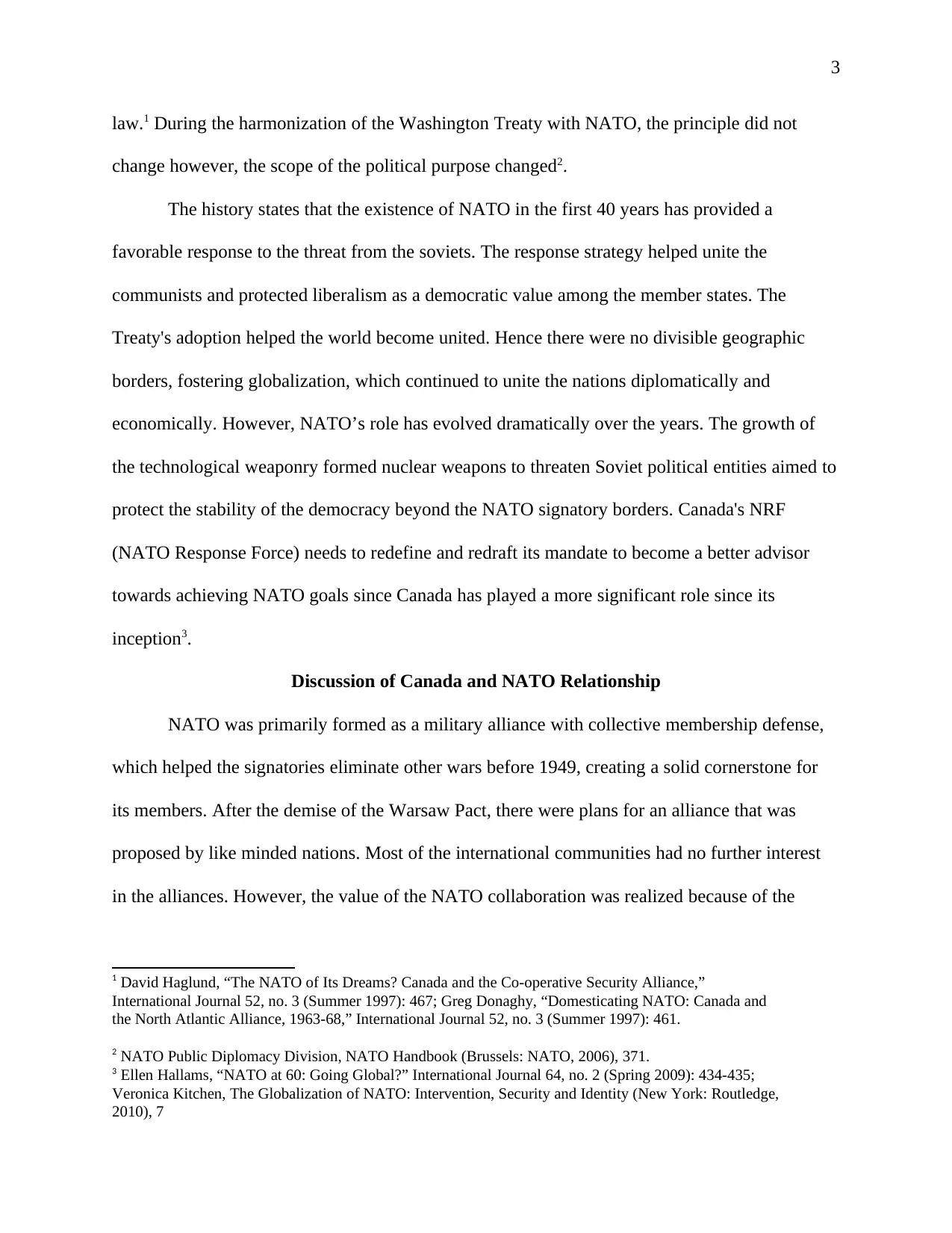
3
law.1 During the harmonization of the Washington Treaty with NATO, the principle did not
change however, the scope of the political purpose changed2.
The history states that the existence of NATO in the first 40 years has provided a
favorable response to the threat from the soviets. The response strategy helped unite the
communists and protected liberalism as a democratic value among the member states. The
Treaty's adoption helped the world become united. Hence there were no divisible geographic
borders, fostering globalization, which continued to unite the nations diplomatically and
economically. However, NATO’s role has evolved dramatically over the years. The growth of
the technological weaponry formed nuclear weapons to threaten Soviet political entities aimed to
protect the stability of the democracy beyond the NATO signatory borders. Canada's NRF
(NATO Response Force) needs to redefine and redraft its mandate to become a better advisor
towards achieving NATO goals since Canada has played a more significant role since its
inception3.
Discussion of Canada and NATO Relationship
NATO was primarily formed as a military alliance with collective membership defense,
which helped the signatories eliminate other wars before 1949, creating a solid cornerstone for
its members. After the demise of the Warsaw Pact, there were plans for an alliance that was
proposed by like minded nations. Most of the international communities had no further interest
in the alliances. However, the value of the NATO collaboration was realized because of the
1 David Haglund, “The NATO of Its Dreams? Canada and the Co-operative Security Alliance,”
International Journal 52, no. 3 (Summer 1997): 467; Greg Donaghy, “Domesticating NATO: Canada and
the North Atlantic Alliance, 1963-68,” International Journal 52, no. 3 (Summer 1997): 461.
2 NATO Public Diplomacy Division, NATO Handbook (Brussels: NATO, 2006), 371.
3 Ellen Hallams, “NATO at 60: Going Global?” International Journal 64, no. 2 (Spring 2009): 434-435;
Veronica Kitchen, The Globalization of NATO: Intervention, Security and Identity (New York: Routledge,
2010), 7
law.1 During the harmonization of the Washington Treaty with NATO, the principle did not
change however, the scope of the political purpose changed2.
The history states that the existence of NATO in the first 40 years has provided a
favorable response to the threat from the soviets. The response strategy helped unite the
communists and protected liberalism as a democratic value among the member states. The
Treaty's adoption helped the world become united. Hence there were no divisible geographic
borders, fostering globalization, which continued to unite the nations diplomatically and
economically. However, NATO’s role has evolved dramatically over the years. The growth of
the technological weaponry formed nuclear weapons to threaten Soviet political entities aimed to
protect the stability of the democracy beyond the NATO signatory borders. Canada's NRF
(NATO Response Force) needs to redefine and redraft its mandate to become a better advisor
towards achieving NATO goals since Canada has played a more significant role since its
inception3.
Discussion of Canada and NATO Relationship
NATO was primarily formed as a military alliance with collective membership defense,
which helped the signatories eliminate other wars before 1949, creating a solid cornerstone for
its members. After the demise of the Warsaw Pact, there were plans for an alliance that was
proposed by like minded nations. Most of the international communities had no further interest
in the alliances. However, the value of the NATO collaboration was realized because of the
1 David Haglund, “The NATO of Its Dreams? Canada and the Co-operative Security Alliance,”
International Journal 52, no. 3 (Summer 1997): 467; Greg Donaghy, “Domesticating NATO: Canada and
the North Atlantic Alliance, 1963-68,” International Journal 52, no. 3 (Summer 1997): 461.
2 NATO Public Diplomacy Division, NATO Handbook (Brussels: NATO, 2006), 371.
3 Ellen Hallams, “NATO at 60: Going Global?” International Journal 64, no. 2 (Spring 2009): 434-435;
Veronica Kitchen, The Globalization of NATO: Intervention, Security and Identity (New York: Routledge,
2010), 7
Paraphrase This Document
Need a fresh take? Get an instant paraphrase of this document with our AI Paraphraser
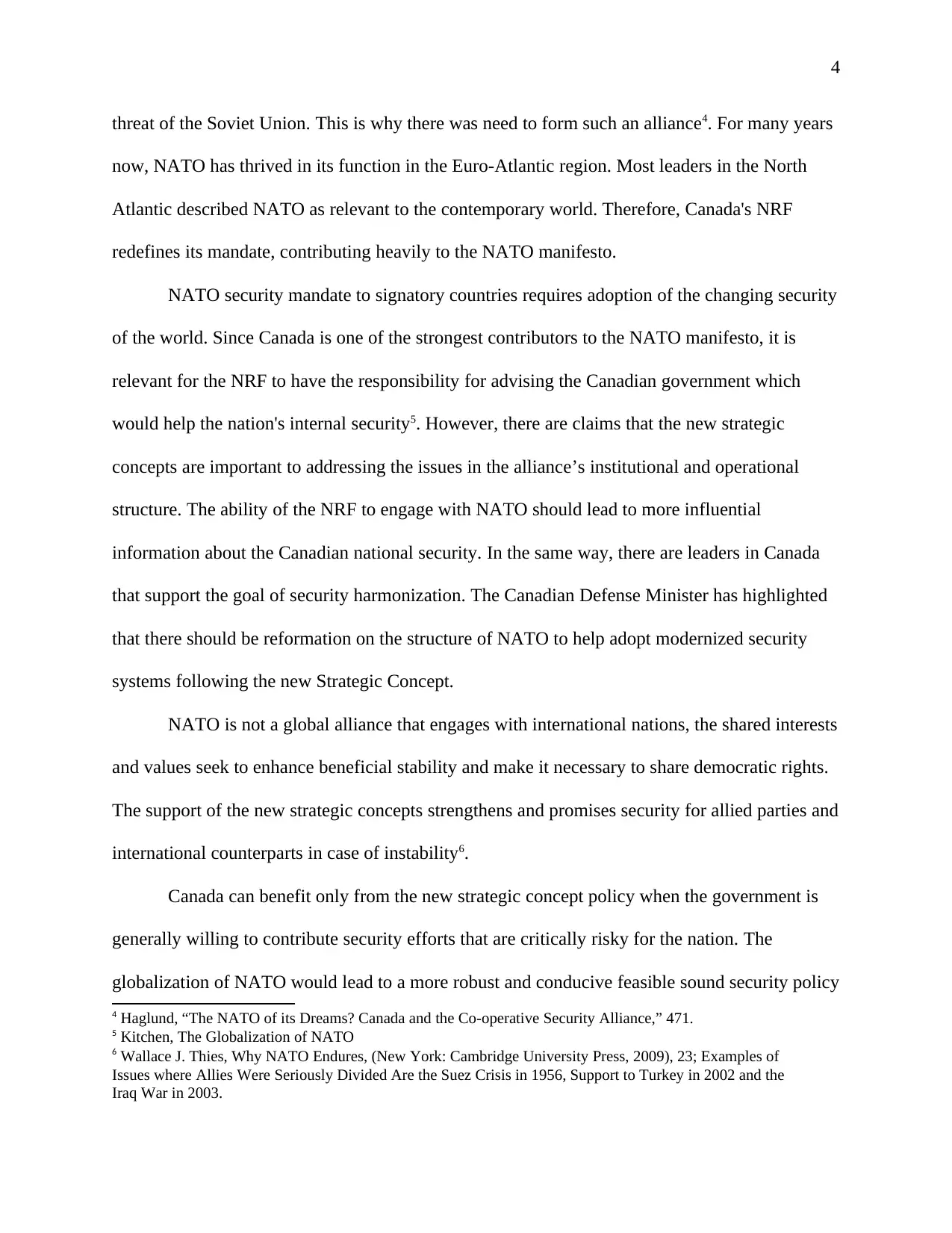
4
threat of the Soviet Union. This is why there was need to form such an alliance4. For many years
now, NATO has thrived in its function in the Euro-Atlantic region. Most leaders in the North
Atlantic described NATO as relevant to the contemporary world. Therefore, Canada's NRF
redefines its mandate, contributing heavily to the NATO manifesto.
NATO security mandate to signatory countries requires adoption of the changing security
of the world. Since Canada is one of the strongest contributors to the NATO manifesto, it is
relevant for the NRF to have the responsibility for advising the Canadian government which
would help the nation's internal security5. However, there are claims that the new strategic
concepts are important to addressing the issues in the alliance’s institutional and operational
structure. The ability of the NRF to engage with NATO should lead to more influential
information about the Canadian national security. In the same way, there are leaders in Canada
that support the goal of security harmonization. The Canadian Defense Minister has highlighted
that there should be reformation on the structure of NATO to help adopt modernized security
systems following the new Strategic Concept.
NATO is not a global alliance that engages with international nations, the shared interests
and values seek to enhance beneficial stability and make it necessary to share democratic rights.
The support of the new strategic concepts strengthens and promises security for allied parties and
international counterparts in case of instability6.
Canada can benefit only from the new strategic concept policy when the government is
generally willing to contribute security efforts that are critically risky for the nation. The
globalization of NATO would lead to a more robust and conducive feasible sound security policy
4 Haglund, “The NATO of its Dreams? Canada and the Co-operative Security Alliance,” 471.
5 Kitchen, The Globalization of NATO
6 Wallace J. Thies, Why NATO Endures, (New York: Cambridge University Press, 2009), 23; Examples of
Issues where Allies Were Seriously Divided Are the Suez Crisis in 1956, Support to Turkey in 2002 and the
Iraq War in 2003.
threat of the Soviet Union. This is why there was need to form such an alliance4. For many years
now, NATO has thrived in its function in the Euro-Atlantic region. Most leaders in the North
Atlantic described NATO as relevant to the contemporary world. Therefore, Canada's NRF
redefines its mandate, contributing heavily to the NATO manifesto.
NATO security mandate to signatory countries requires adoption of the changing security
of the world. Since Canada is one of the strongest contributors to the NATO manifesto, it is
relevant for the NRF to have the responsibility for advising the Canadian government which
would help the nation's internal security5. However, there are claims that the new strategic
concepts are important to addressing the issues in the alliance’s institutional and operational
structure. The ability of the NRF to engage with NATO should lead to more influential
information about the Canadian national security. In the same way, there are leaders in Canada
that support the goal of security harmonization. The Canadian Defense Minister has highlighted
that there should be reformation on the structure of NATO to help adopt modernized security
systems following the new Strategic Concept.
NATO is not a global alliance that engages with international nations, the shared interests
and values seek to enhance beneficial stability and make it necessary to share democratic rights.
The support of the new strategic concepts strengthens and promises security for allied parties and
international counterparts in case of instability6.
Canada can benefit only from the new strategic concept policy when the government is
generally willing to contribute security efforts that are critically risky for the nation. The
globalization of NATO would lead to a more robust and conducive feasible sound security policy
4 Haglund, “The NATO of its Dreams? Canada and the Co-operative Security Alliance,” 471.
5 Kitchen, The Globalization of NATO
6 Wallace J. Thies, Why NATO Endures, (New York: Cambridge University Press, 2009), 23; Examples of
Issues where Allies Were Seriously Divided Are the Suez Crisis in 1956, Support to Turkey in 2002 and the
Iraq War in 2003.
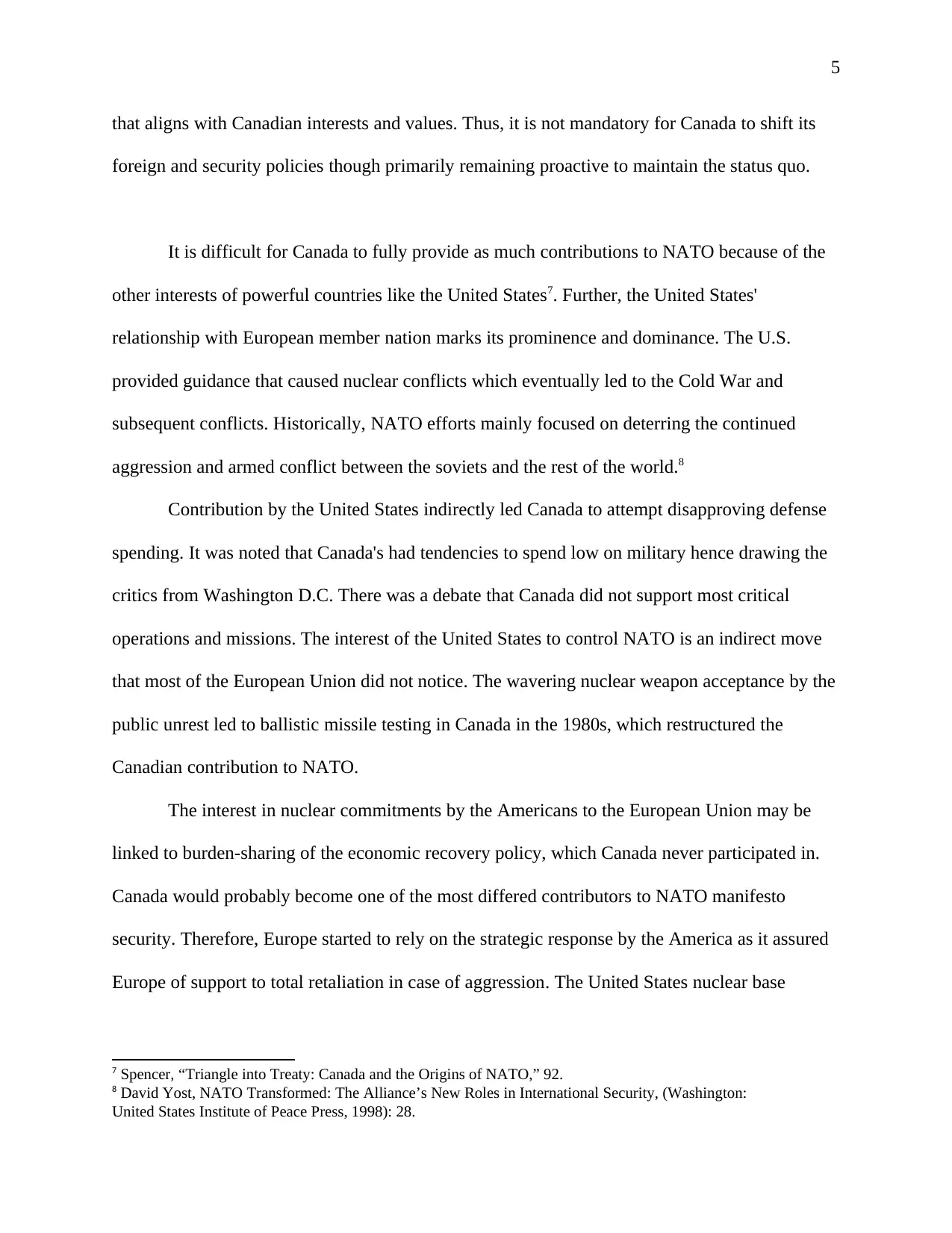
5
that aligns with Canadian interests and values. Thus, it is not mandatory for Canada to shift its
foreign and security policies though primarily remaining proactive to maintain the status quo.
It is difficult for Canada to fully provide as much contributions to NATO because of the
other interests of powerful countries like the United States7. Further, the United States'
relationship with European member nation marks its prominence and dominance. The U.S.
provided guidance that caused nuclear conflicts which eventually led to the Cold War and
subsequent conflicts. Historically, NATO efforts mainly focused on deterring the continued
aggression and armed conflict between the soviets and the rest of the world.8
Contribution by the United States indirectly led Canada to attempt disapproving defense
spending. It was noted that Canada's had tendencies to spend low on military hence drawing the
critics from Washington D.C. There was a debate that Canada did not support most critical
operations and missions. The interest of the United States to control NATO is an indirect move
that most of the European Union did not notice. The wavering nuclear weapon acceptance by the
public unrest led to ballistic missile testing in Canada in the 1980s, which restructured the
Canadian contribution to NATO.
The interest in nuclear commitments by the Americans to the European Union may be
linked to burden-sharing of the economic recovery policy, which Canada never participated in.
Canada would probably become one of the most differed contributors to NATO manifesto
security. Therefore, Europe started to rely on the strategic response by the America as it assured
Europe of support to total retaliation in case of aggression. The United States nuclear base
7 Spencer, “Triangle into Treaty: Canada and the Origins of NATO,” 92.
8 David Yost, NATO Transformed: The Alliance’s New Roles in International Security, (Washington:
United States Institute of Peace Press, 1998): 28.
that aligns with Canadian interests and values. Thus, it is not mandatory for Canada to shift its
foreign and security policies though primarily remaining proactive to maintain the status quo.
It is difficult for Canada to fully provide as much contributions to NATO because of the
other interests of powerful countries like the United States7. Further, the United States'
relationship with European member nation marks its prominence and dominance. The U.S.
provided guidance that caused nuclear conflicts which eventually led to the Cold War and
subsequent conflicts. Historically, NATO efforts mainly focused on deterring the continued
aggression and armed conflict between the soviets and the rest of the world.8
Contribution by the United States indirectly led Canada to attempt disapproving defense
spending. It was noted that Canada's had tendencies to spend low on military hence drawing the
critics from Washington D.C. There was a debate that Canada did not support most critical
operations and missions. The interest of the United States to control NATO is an indirect move
that most of the European Union did not notice. The wavering nuclear weapon acceptance by the
public unrest led to ballistic missile testing in Canada in the 1980s, which restructured the
Canadian contribution to NATO.
The interest in nuclear commitments by the Americans to the European Union may be
linked to burden-sharing of the economic recovery policy, which Canada never participated in.
Canada would probably become one of the most differed contributors to NATO manifesto
security. Therefore, Europe started to rely on the strategic response by the America as it assured
Europe of support to total retaliation in case of aggression. The United States nuclear base
7 Spencer, “Triangle into Treaty: Canada and the Origins of NATO,” 92.
8 David Yost, NATO Transformed: The Alliance’s New Roles in International Security, (Washington:
United States Institute of Peace Press, 1998): 28.
⊘ This is a preview!⊘
Do you want full access?
Subscribe today to unlock all pages.

Trusted by 1+ million students worldwide
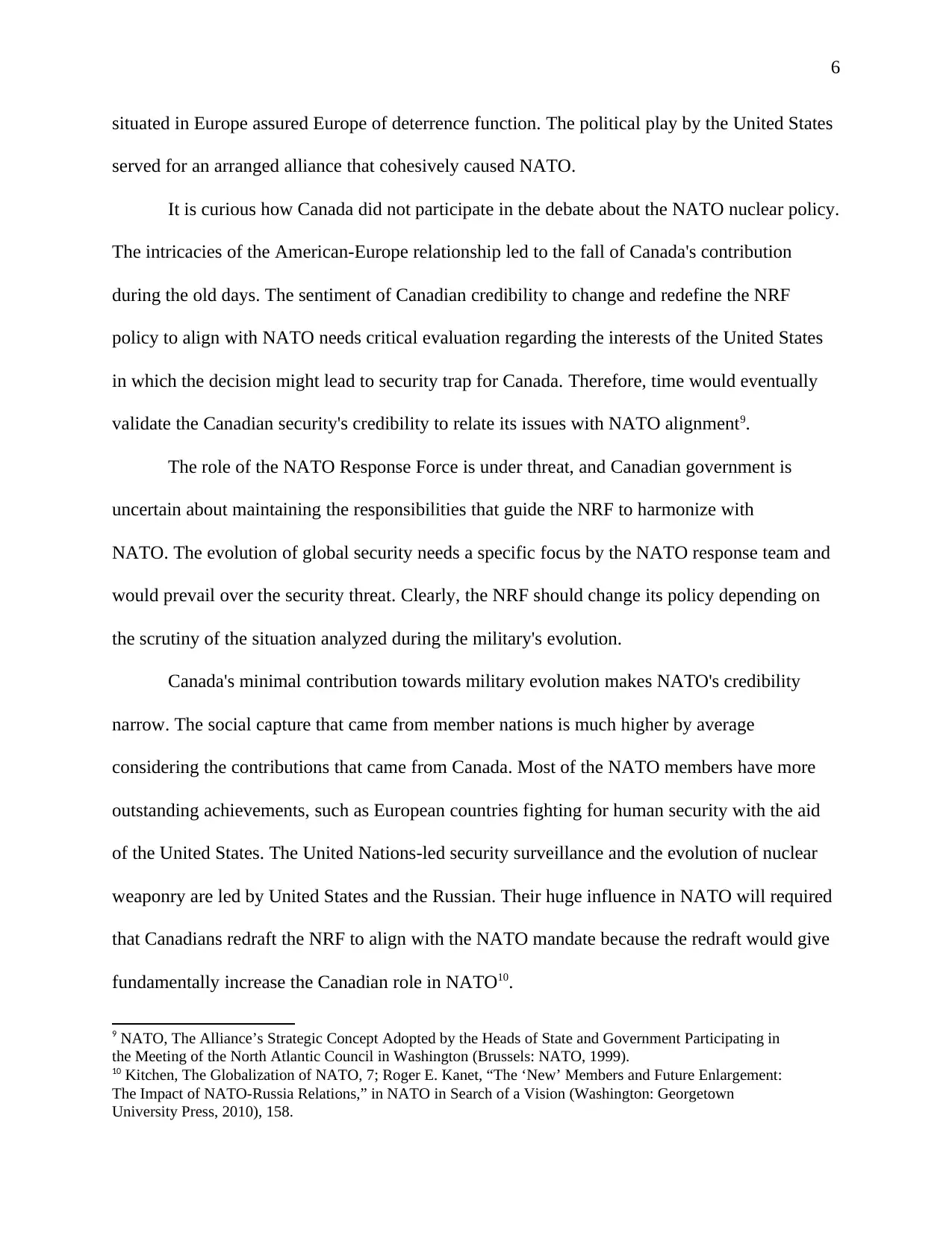
6
situated in Europe assured Europe of deterrence function. The political play by the United States
served for an arranged alliance that cohesively caused NATO.
It is curious how Canada did not participate in the debate about the NATO nuclear policy.
The intricacies of the American-Europe relationship led to the fall of Canada's contribution
during the old days. The sentiment of Canadian credibility to change and redefine the NRF
policy to align with NATO needs critical evaluation regarding the interests of the United States
in which the decision might lead to security trap for Canada. Therefore, time would eventually
validate the Canadian security's credibility to relate its issues with NATO alignment9.
The role of the NATO Response Force is under threat, and Canadian government is
uncertain about maintaining the responsibilities that guide the NRF to harmonize with
NATO. The evolution of global security needs a specific focus by the NATO response team and
would prevail over the security threat. Clearly, the NRF should change its policy depending on
the scrutiny of the situation analyzed during the military's evolution.
Canada's minimal contribution towards military evolution makes NATO's credibility
narrow. The social capture that came from member nations is much higher by average
considering the contributions that came from Canada. Most of the NATO members have more
outstanding achievements, such as European countries fighting for human security with the aid
of the United States. The United Nations-led security surveillance and the evolution of nuclear
weaponry are led by United States and the Russian. Their huge influence in NATO will required
that Canadians redraft the NRF to align with the NATO mandate because the redraft would give
fundamentally increase the Canadian role in NATO10.
9 NATO, The Alliance’s Strategic Concept Adopted by the Heads of State and Government Participating in
the Meeting of the North Atlantic Council in Washington (Brussels: NATO, 1999).
10 Kitchen, The Globalization of NATO, 7; Roger E. Kanet, “The ‘New’ Members and Future Enlargement:
The Impact of NATO-Russia Relations,” in NATO in Search of a Vision (Washington: Georgetown
University Press, 2010), 158.
situated in Europe assured Europe of deterrence function. The political play by the United States
served for an arranged alliance that cohesively caused NATO.
It is curious how Canada did not participate in the debate about the NATO nuclear policy.
The intricacies of the American-Europe relationship led to the fall of Canada's contribution
during the old days. The sentiment of Canadian credibility to change and redefine the NRF
policy to align with NATO needs critical evaluation regarding the interests of the United States
in which the decision might lead to security trap for Canada. Therefore, time would eventually
validate the Canadian security's credibility to relate its issues with NATO alignment9.
The role of the NATO Response Force is under threat, and Canadian government is
uncertain about maintaining the responsibilities that guide the NRF to harmonize with
NATO. The evolution of global security needs a specific focus by the NATO response team and
would prevail over the security threat. Clearly, the NRF should change its policy depending on
the scrutiny of the situation analyzed during the military's evolution.
Canada's minimal contribution towards military evolution makes NATO's credibility
narrow. The social capture that came from member nations is much higher by average
considering the contributions that came from Canada. Most of the NATO members have more
outstanding achievements, such as European countries fighting for human security with the aid
of the United States. The United Nations-led security surveillance and the evolution of nuclear
weaponry are led by United States and the Russian. Their huge influence in NATO will required
that Canadians redraft the NRF to align with the NATO mandate because the redraft would give
fundamentally increase the Canadian role in NATO10.
9 NATO, The Alliance’s Strategic Concept Adopted by the Heads of State and Government Participating in
the Meeting of the North Atlantic Council in Washington (Brussels: NATO, 1999).
10 Kitchen, The Globalization of NATO, 7; Roger E. Kanet, “The ‘New’ Members and Future Enlargement:
The Impact of NATO-Russia Relations,” in NATO in Search of a Vision (Washington: Georgetown
University Press, 2010), 158.
Paraphrase This Document
Need a fresh take? Get an instant paraphrase of this document with our AI Paraphraser
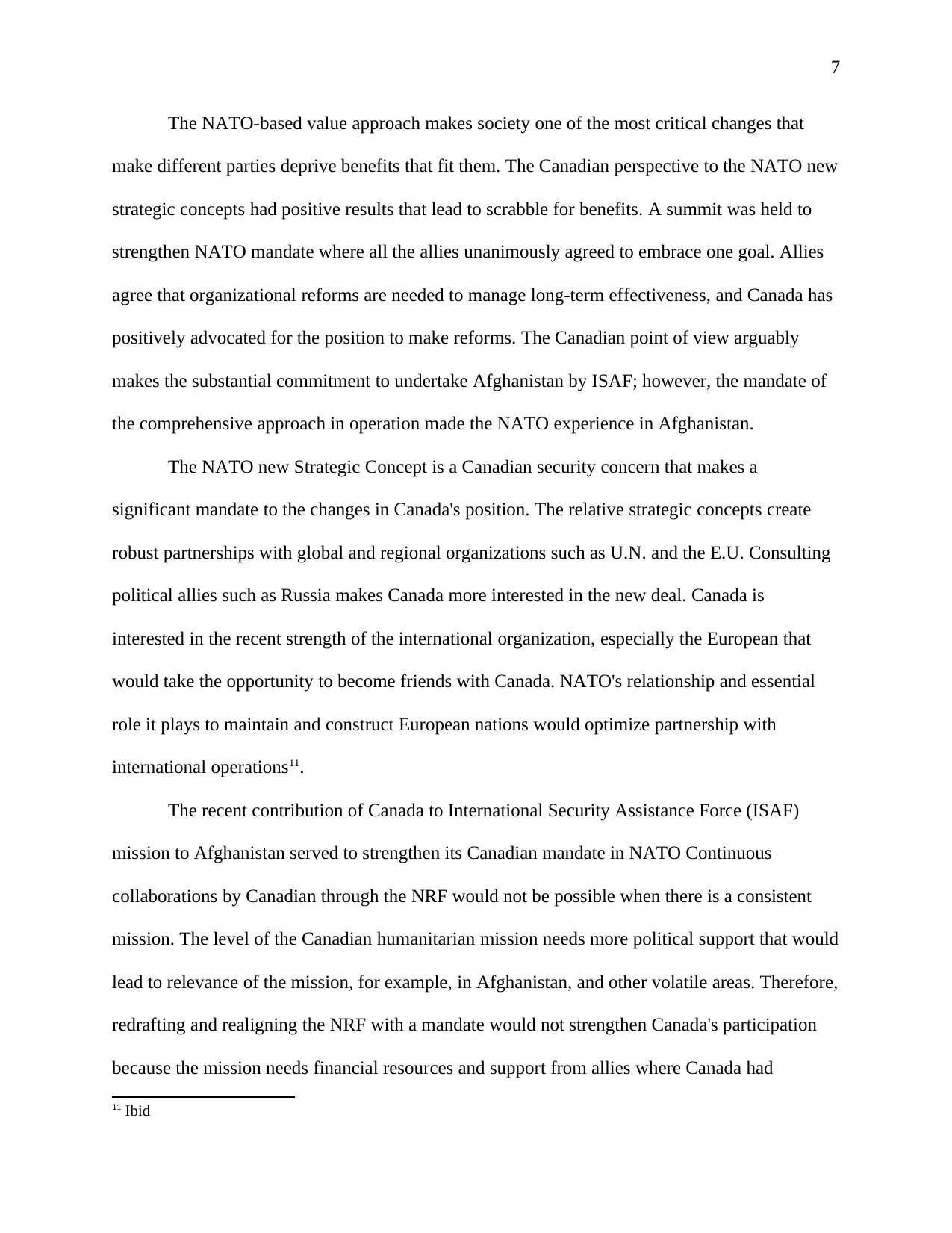
7
The NATO-based value approach makes society one of the most critical changes that
make different parties deprive benefits that fit them. The Canadian perspective to the NATO new
strategic concepts had positive results that lead to scrabble for benefits. A summit was held to
strengthen NATO mandate where all the allies unanimously agreed to embrace one goal. Allies
agree that organizational reforms are needed to manage long-term effectiveness, and Canada has
positively advocated for the position to make reforms. The Canadian point of view arguably
makes the substantial commitment to undertake Afghanistan by ISAF; however, the mandate of
the comprehensive approach in operation made the NATO experience in Afghanistan.
The NATO new Strategic Concept is a Canadian security concern that makes a
significant mandate to the changes in Canada's position. The relative strategic concepts create
robust partnerships with global and regional organizations such as U.N. and the E.U. Consulting
political allies such as Russia makes Canada more interested in the new deal. Canada is
interested in the recent strength of the international organization, especially the European that
would take the opportunity to become friends with Canada. NATO's relationship and essential
role it plays to maintain and construct European nations would optimize partnership with
international operations11.
The recent contribution of Canada to International Security Assistance Force (ISAF)
mission to Afghanistan served to strengthen its Canadian mandate in NATO Continuous
collaborations by Canadian through the NRF would not be possible when there is a consistent
mission. The level of the Canadian humanitarian mission needs more political support that would
lead to relevance of the mission, for example, in Afghanistan, and other volatile areas. Therefore,
redrafting and realigning the NRF with a mandate would not strengthen Canada's participation
because the mission needs financial resources and support from allies where Canada had
11 Ibid
The NATO-based value approach makes society one of the most critical changes that
make different parties deprive benefits that fit them. The Canadian perspective to the NATO new
strategic concepts had positive results that lead to scrabble for benefits. A summit was held to
strengthen NATO mandate where all the allies unanimously agreed to embrace one goal. Allies
agree that organizational reforms are needed to manage long-term effectiveness, and Canada has
positively advocated for the position to make reforms. The Canadian point of view arguably
makes the substantial commitment to undertake Afghanistan by ISAF; however, the mandate of
the comprehensive approach in operation made the NATO experience in Afghanistan.
The NATO new Strategic Concept is a Canadian security concern that makes a
significant mandate to the changes in Canada's position. The relative strategic concepts create
robust partnerships with global and regional organizations such as U.N. and the E.U. Consulting
political allies such as Russia makes Canada more interested in the new deal. Canada is
interested in the recent strength of the international organization, especially the European that
would take the opportunity to become friends with Canada. NATO's relationship and essential
role it plays to maintain and construct European nations would optimize partnership with
international operations11.
The recent contribution of Canada to International Security Assistance Force (ISAF)
mission to Afghanistan served to strengthen its Canadian mandate in NATO Continuous
collaborations by Canadian through the NRF would not be possible when there is a consistent
mission. The level of the Canadian humanitarian mission needs more political support that would
lead to relevance of the mission, for example, in Afghanistan, and other volatile areas. Therefore,
redrafting and realigning the NRF with a mandate would not strengthen Canada's participation
because the mission needs financial resources and support from allies where Canada had
11 Ibid
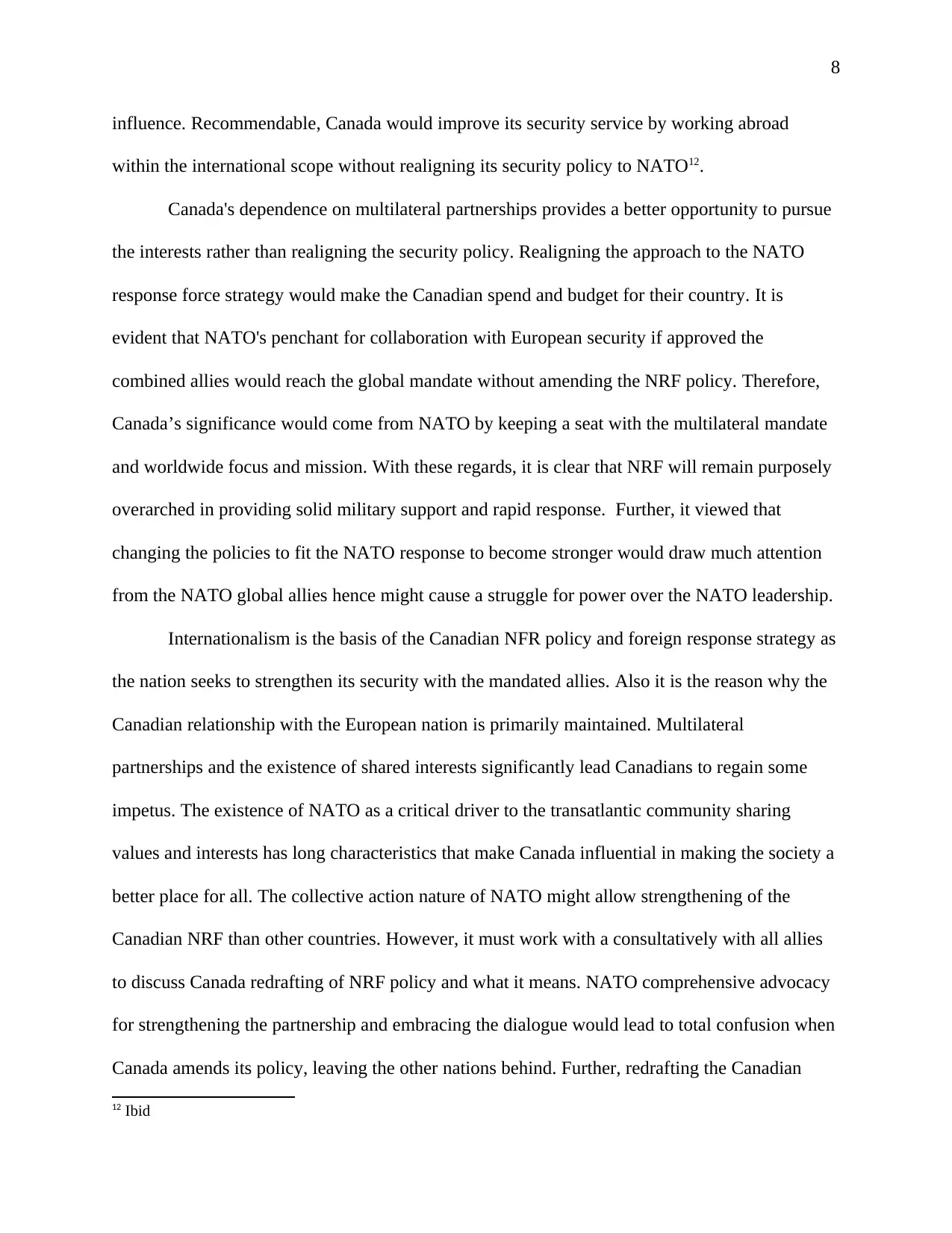
8
influence. Recommendable, Canada would improve its security service by working abroad
within the international scope without realigning its security policy to NATO12.
Canada's dependence on multilateral partnerships provides a better opportunity to pursue
the interests rather than realigning the security policy. Realigning the approach to the NATO
response force strategy would make the Canadian spend and budget for their country. It is
evident that NATO's penchant for collaboration with European security if approved the
combined allies would reach the global mandate without amending the NRF policy. Therefore,
Canada’s significance would come from NATO by keeping a seat with the multilateral mandate
and worldwide focus and mission. With these regards, it is clear that NRF will remain purposely
overarched in providing solid military support and rapid response. Further, it viewed that
changing the policies to fit the NATO response to become stronger would draw much attention
from the NATO global allies hence might cause a struggle for power over the NATO leadership.
Internationalism is the basis of the Canadian NFR policy and foreign response strategy as
the nation seeks to strengthen its security with the mandated allies. Also it is the reason why the
Canadian relationship with the European nation is primarily maintained. Multilateral
partnerships and the existence of shared interests significantly lead Canadians to regain some
impetus. The existence of NATO as a critical driver to the transatlantic community sharing
values and interests has long characteristics that make Canada influential in making the society a
better place for all. The collective action nature of NATO might allow strengthening of the
Canadian NRF than other countries. However, it must work with a consultatively with all allies
to discuss Canada redrafting of NRF policy and what it means. NATO comprehensive advocacy
for strengthening the partnership and embracing the dialogue would lead to total confusion when
Canada amends its policy, leaving the other nations behind. Further, redrafting the Canadian
12 Ibid
influence. Recommendable, Canada would improve its security service by working abroad
within the international scope without realigning its security policy to NATO12.
Canada's dependence on multilateral partnerships provides a better opportunity to pursue
the interests rather than realigning the security policy. Realigning the approach to the NATO
response force strategy would make the Canadian spend and budget for their country. It is
evident that NATO's penchant for collaboration with European security if approved the
combined allies would reach the global mandate without amending the NRF policy. Therefore,
Canada’s significance would come from NATO by keeping a seat with the multilateral mandate
and worldwide focus and mission. With these regards, it is clear that NRF will remain purposely
overarched in providing solid military support and rapid response. Further, it viewed that
changing the policies to fit the NATO response to become stronger would draw much attention
from the NATO global allies hence might cause a struggle for power over the NATO leadership.
Internationalism is the basis of the Canadian NFR policy and foreign response strategy as
the nation seeks to strengthen its security with the mandated allies. Also it is the reason why the
Canadian relationship with the European nation is primarily maintained. Multilateral
partnerships and the existence of shared interests significantly lead Canadians to regain some
impetus. The existence of NATO as a critical driver to the transatlantic community sharing
values and interests has long characteristics that make Canada influential in making the society a
better place for all. The collective action nature of NATO might allow strengthening of the
Canadian NRF than other countries. However, it must work with a consultatively with all allies
to discuss Canada redrafting of NRF policy and what it means. NATO comprehensive advocacy
for strengthening the partnership and embracing the dialogue would lead to total confusion when
Canada amends its policy, leaving the other nations behind. Further, redrafting the Canadian
12 Ibid
⊘ This is a preview!⊘
Do you want full access?
Subscribe today to unlock all pages.

Trusted by 1+ million students worldwide
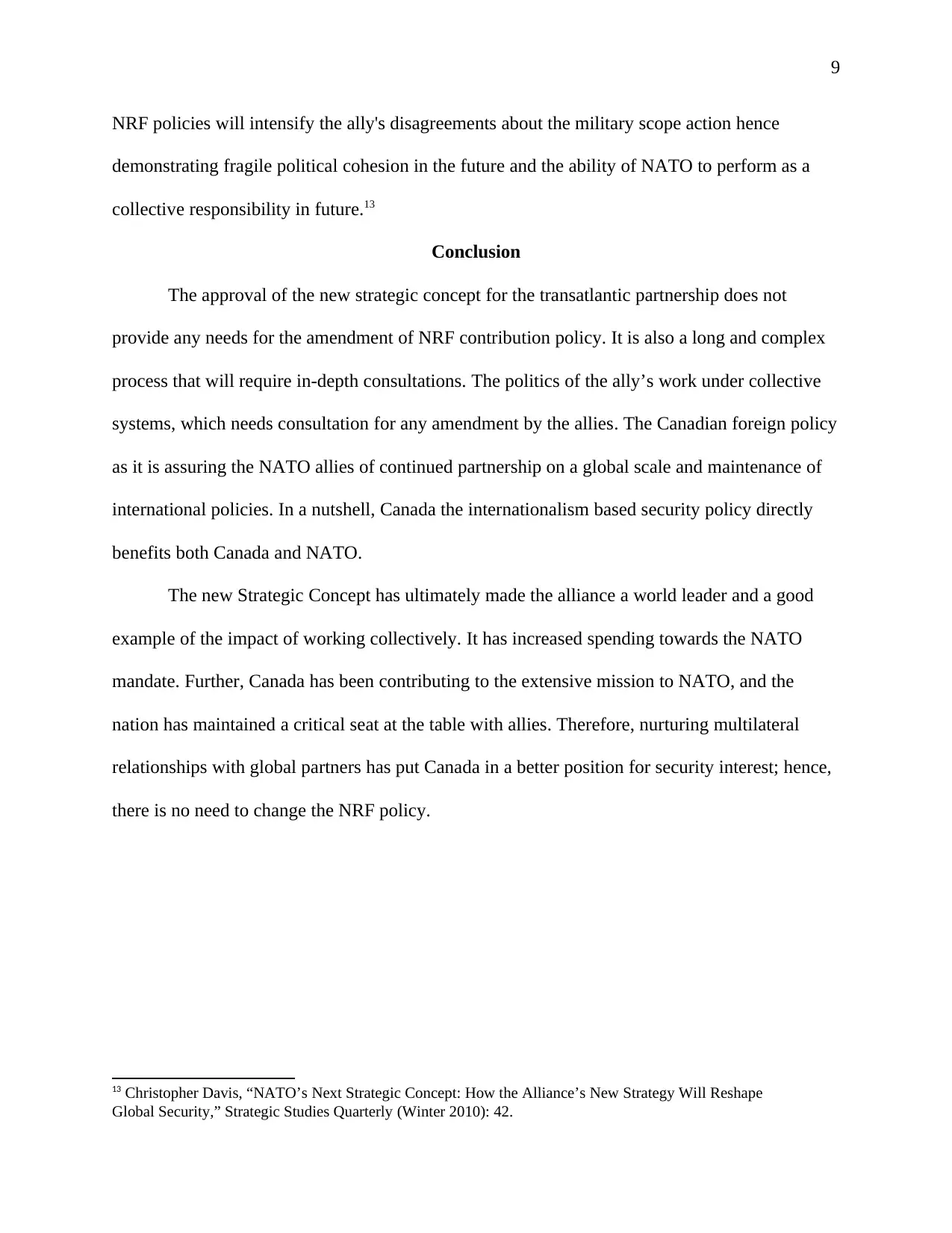
9
NRF policies will intensify the ally's disagreements about the military scope action hence
demonstrating fragile political cohesion in the future and the ability of NATO to perform as a
collective responsibility in future.13
Conclusion
The approval of the new strategic concept for the transatlantic partnership does not
provide any needs for the amendment of NRF contribution policy. It is also a long and complex
process that will require in-depth consultations. The politics of the ally’s work under collective
systems, which needs consultation for any amendment by the allies. The Canadian foreign policy
as it is assuring the NATO allies of continued partnership on a global scale and maintenance of
international policies. In a nutshell, Canada the internationalism based security policy directly
benefits both Canada and NATO.
The new Strategic Concept has ultimately made the alliance a world leader and a good
example of the impact of working collectively. It has increased spending towards the NATO
mandate. Further, Canada has been contributing to the extensive mission to NATO, and the
nation has maintained a critical seat at the table with allies. Therefore, nurturing multilateral
relationships with global partners has put Canada in a better position for security interest; hence,
there is no need to change the NRF policy.
13 Christopher Davis, “NATO’s Next Strategic Concept: How the Alliance’s New Strategy Will Reshape
Global Security,” Strategic Studies Quarterly (Winter 2010): 42.
NRF policies will intensify the ally's disagreements about the military scope action hence
demonstrating fragile political cohesion in the future and the ability of NATO to perform as a
collective responsibility in future.13
Conclusion
The approval of the new strategic concept for the transatlantic partnership does not
provide any needs for the amendment of NRF contribution policy. It is also a long and complex
process that will require in-depth consultations. The politics of the ally’s work under collective
systems, which needs consultation for any amendment by the allies. The Canadian foreign policy
as it is assuring the NATO allies of continued partnership on a global scale and maintenance of
international policies. In a nutshell, Canada the internationalism based security policy directly
benefits both Canada and NATO.
The new Strategic Concept has ultimately made the alliance a world leader and a good
example of the impact of working collectively. It has increased spending towards the NATO
mandate. Further, Canada has been contributing to the extensive mission to NATO, and the
nation has maintained a critical seat at the table with allies. Therefore, nurturing multilateral
relationships with global partners has put Canada in a better position for security interest; hence,
there is no need to change the NRF policy.
13 Christopher Davis, “NATO’s Next Strategic Concept: How the Alliance’s New Strategy Will Reshape
Global Security,” Strategic Studies Quarterly (Winter 2010): 42.
Paraphrase This Document
Need a fresh take? Get an instant paraphrase of this document with our AI Paraphraser
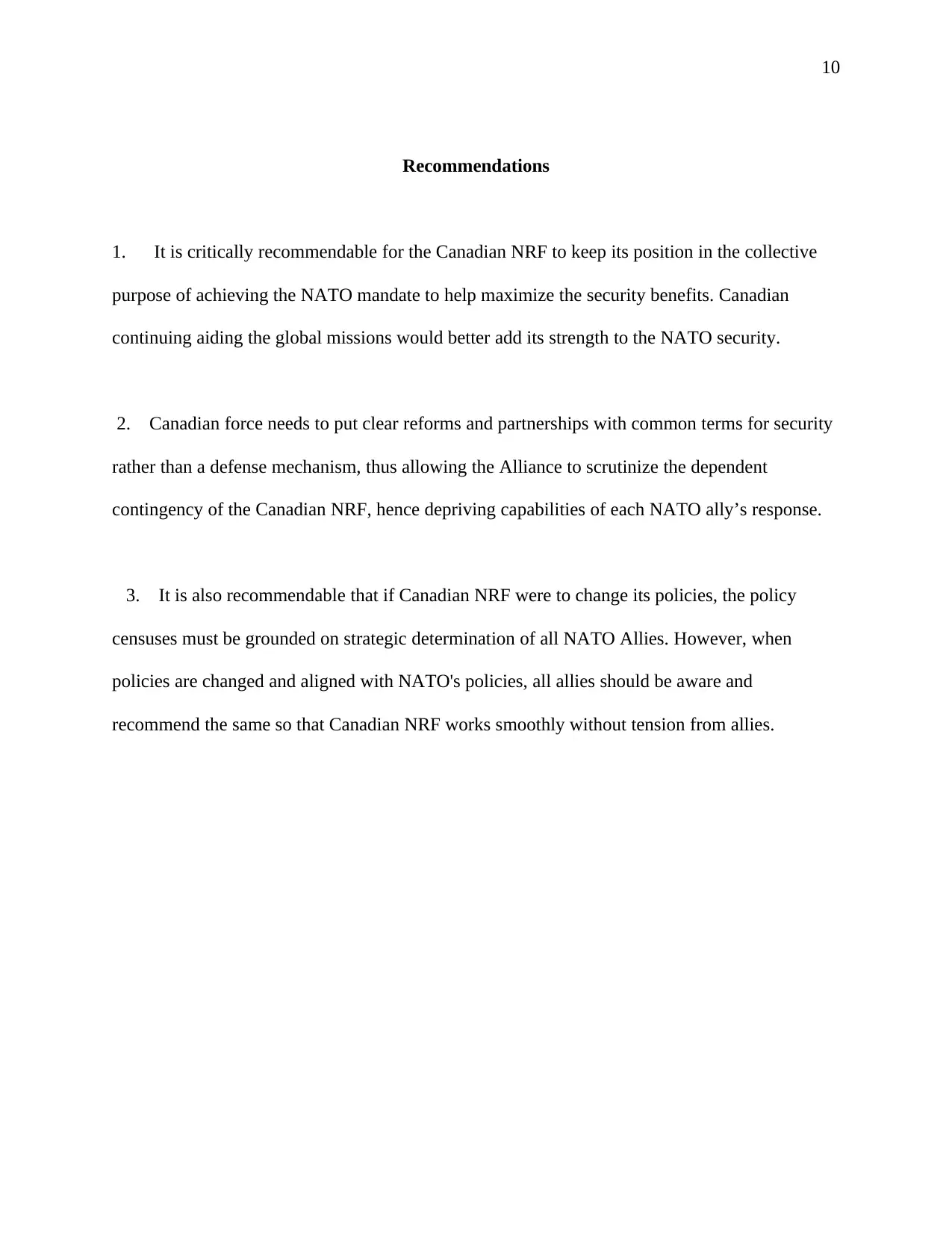
10
Recommendations
1. It is critically recommendable for the Canadian NRF to keep its position in the collective
purpose of achieving the NATO mandate to help maximize the security benefits. Canadian
continuing aiding the global missions would better add its strength to the NATO security.
2. Canadian force needs to put clear reforms and partnerships with common terms for security
rather than a defense mechanism, thus allowing the Alliance to scrutinize the dependent
contingency of the Canadian NRF, hence depriving capabilities of each NATO ally’s response.
3. It is also recommendable that if Canadian NRF were to change its policies, the policy
censuses must be grounded on strategic determination of all NATO Allies. However, when
policies are changed and aligned with NATO's policies, all allies should be aware and
recommend the same so that Canadian NRF works smoothly without tension from allies.
Recommendations
1. It is critically recommendable for the Canadian NRF to keep its position in the collective
purpose of achieving the NATO mandate to help maximize the security benefits. Canadian
continuing aiding the global missions would better add its strength to the NATO security.
2. Canadian force needs to put clear reforms and partnerships with common terms for security
rather than a defense mechanism, thus allowing the Alliance to scrutinize the dependent
contingency of the Canadian NRF, hence depriving capabilities of each NATO ally’s response.
3. It is also recommendable that if Canadian NRF were to change its policies, the policy
censuses must be grounded on strategic determination of all NATO Allies. However, when
policies are changed and aligned with NATO's policies, all allies should be aware and
recommend the same so that Canadian NRF works smoothly without tension from allies.
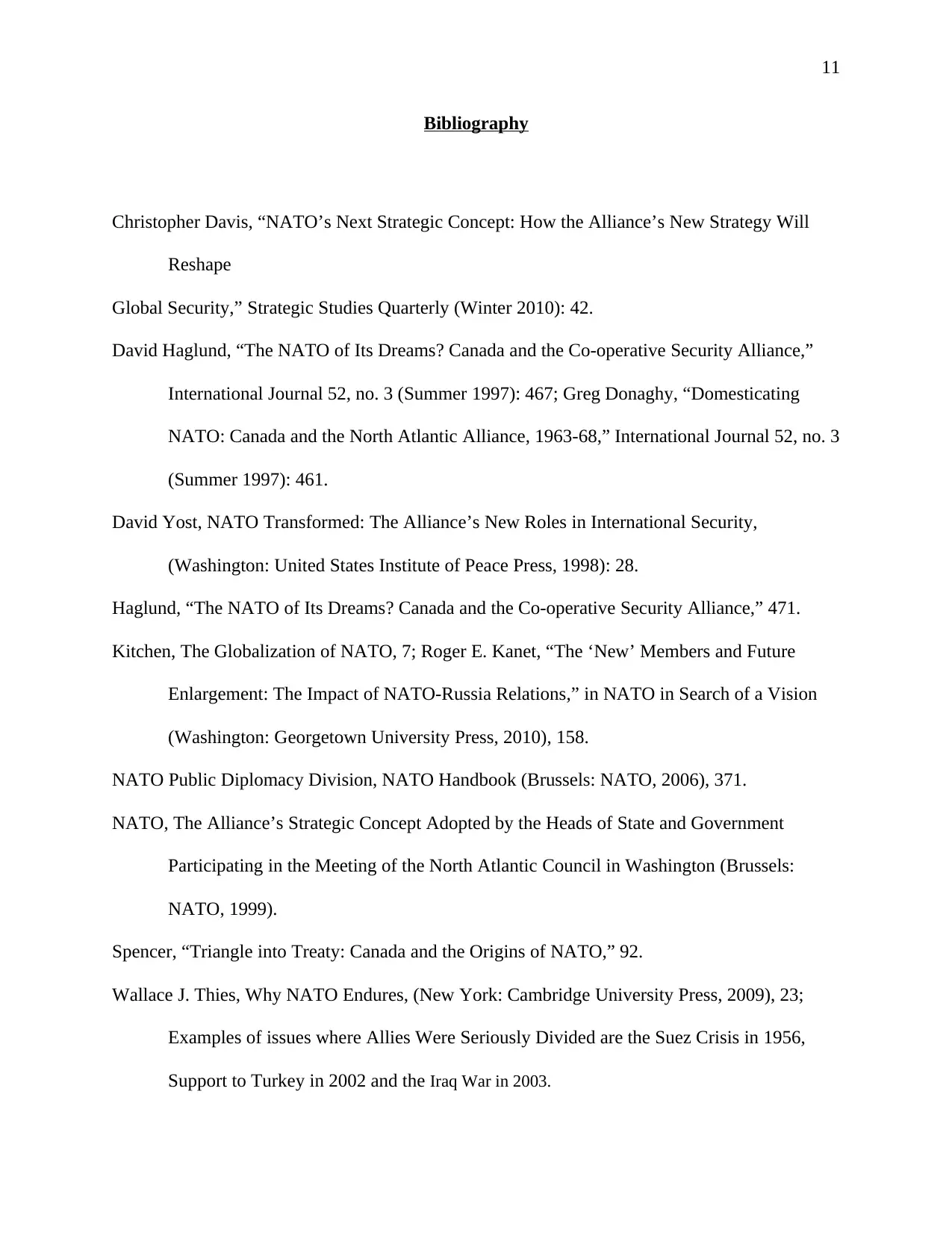
11
Bibliography
Christopher Davis, “NATO’s Next Strategic Concept: How the Alliance’s New Strategy Will
Reshape
Global Security,” Strategic Studies Quarterly (Winter 2010): 42.
David Haglund, “The NATO of Its Dreams? Canada and the Co-operative Security Alliance,”
International Journal 52, no. 3 (Summer 1997): 467; Greg Donaghy, “Domesticating
NATO: Canada and the North Atlantic Alliance, 1963-68,” International Journal 52, no. 3
(Summer 1997): 461.
David Yost, NATO Transformed: The Alliance’s New Roles in International Security,
(Washington: United States Institute of Peace Press, 1998): 28.
Haglund, “The NATO of Its Dreams? Canada and the Co-operative Security Alliance,” 471.
Kitchen, The Globalization of NATO, 7; Roger E. Kanet, “The ‘New’ Members and Future
Enlargement: The Impact of NATO-Russia Relations,” in NATO in Search of a Vision
(Washington: Georgetown University Press, 2010), 158.
NATO Public Diplomacy Division, NATO Handbook (Brussels: NATO, 2006), 371.
NATO, The Alliance’s Strategic Concept Adopted by the Heads of State and Government
Participating in the Meeting of the North Atlantic Council in Washington (Brussels:
NATO, 1999).
Spencer, “Triangle into Treaty: Canada and the Origins of NATO,” 92.
Wallace J. Thies, Why NATO Endures, (New York: Cambridge University Press, 2009), 23;
Examples of issues where Allies Were Seriously Divided are the Suez Crisis in 1956,
Support to Turkey in 2002 and the Iraq War in 2003.
Bibliography
Christopher Davis, “NATO’s Next Strategic Concept: How the Alliance’s New Strategy Will
Reshape
Global Security,” Strategic Studies Quarterly (Winter 2010): 42.
David Haglund, “The NATO of Its Dreams? Canada and the Co-operative Security Alliance,”
International Journal 52, no. 3 (Summer 1997): 467; Greg Donaghy, “Domesticating
NATO: Canada and the North Atlantic Alliance, 1963-68,” International Journal 52, no. 3
(Summer 1997): 461.
David Yost, NATO Transformed: The Alliance’s New Roles in International Security,
(Washington: United States Institute of Peace Press, 1998): 28.
Haglund, “The NATO of Its Dreams? Canada and the Co-operative Security Alliance,” 471.
Kitchen, The Globalization of NATO, 7; Roger E. Kanet, “The ‘New’ Members and Future
Enlargement: The Impact of NATO-Russia Relations,” in NATO in Search of a Vision
(Washington: Georgetown University Press, 2010), 158.
NATO Public Diplomacy Division, NATO Handbook (Brussels: NATO, 2006), 371.
NATO, The Alliance’s Strategic Concept Adopted by the Heads of State and Government
Participating in the Meeting of the North Atlantic Council in Washington (Brussels:
NATO, 1999).
Spencer, “Triangle into Treaty: Canada and the Origins of NATO,” 92.
Wallace J. Thies, Why NATO Endures, (New York: Cambridge University Press, 2009), 23;
Examples of issues where Allies Were Seriously Divided are the Suez Crisis in 1956,
Support to Turkey in 2002 and the Iraq War in 2003.
⊘ This is a preview!⊘
Do you want full access?
Subscribe today to unlock all pages.

Trusted by 1+ million students worldwide
1 out of 12
Your All-in-One AI-Powered Toolkit for Academic Success.
+13062052269
info@desklib.com
Available 24*7 on WhatsApp / Email
![[object Object]](/_next/static/media/star-bottom.7253800d.svg)
Unlock your academic potential
Copyright © 2020–2026 A2Z Services. All Rights Reserved. Developed and managed by ZUCOL.